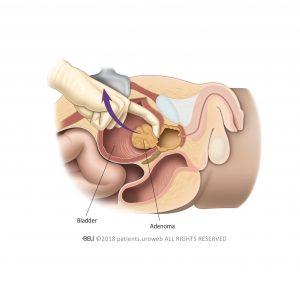Table of Contents
Open prostatectomy is a treatment option for benign prostate enlargement (BPE). It is a type of operation where a large cut is made in the lower part of the abdomen. Because a transurethral resection of the prostate (TURP) or Laser treatments of the prostate (e.g. Holmium enucleation or Thulium vapoenucleation of the prostate) have similar or better results, open prostatectomy to treat BPE is now only done in selected situations.
How is open prostatectomy performed?
For open prostatectomy you will receive general or spinal anaesthesia. During the operation the surgeon cuts into the lower abdomen to reach the bladder and the prostate. The surgeon then uses his finger to remove the enlarged part of the prostate, also called adenoma (Fig. 1). After the operation, the catheter will drain the urine. It is also used to continuously flush your bladder and urethra with sterile solution to prevent blood clots. You will need the catheter for several days until the wound is healed and you can urinate on your own.
When should I consider open prostatectomy?
Open prostatectomy is recommended if your prostate is larger than 80 millilitres because other types of surgery would take more time to achieve the same result. Your doctor may also recommend open prostatectomy if you have bladder stones or a condition called bladder diverticulum.
How do I prepare for the procedure?
Your doctor will advise you in detail about how to prepare for the procedure. You must not eat, drink, or smoke for 6 hours before surgery to prepare for the anaesthesia. If you are taking any prescribed medication, discuss it with your doctor. You may need to stop taking it several days before surgery.
How long will it take me to get back to my daily activities?
Usually you can leave the hospital 5 or 7 days after surgery. The length of hospital stay can vary in different countries. Probably, there will be blood in your urine for several days. You may also suffer from urgency and feel pain when you urinate. It will take several weeks to completely recover from the surgery.
For 4-6 weeks after the surgery:
- Drink 1-2 litres every day, especially water
- Do not lift anything heavier than 5 kilograms
- Do not do any heavy exercise and avoid bike riding
- Do not take thermal baths or go to the sauna
- Prevent constipation by adapting your diet
- Discuss any prescribed medication with your doctor
- Avoid having sex for 2-3 weeks. After open prostatectomy, you may suffer from retrograde ejaculation. This is a chronic condition where semen can no longer leave through the urethra during orgasm. Instead it goes into the bladder and later leaves your body during urination.


